Yi Jing Hexagram 3 - Line 6
The hexagram: 3
An hexagram is a combination of six yin and yang lines.

3.6 (3 > 42) - THE KUN HEXAGRAM
The topmost line, divided, shows (its subject) with the horses of his chariot obliged to retreat, and weeping tears of blood in streams.
Bing DeepL Google Yandex3.6 (3 > 42) - Resolving difficulties
One commits themself alone because others don't want to get involved without proofs. So, one pretends to be disappointed so that they understand that they are no longer welcome.
Bing DeepL Google Yandex3.6 (3 > 42) - Resolving difficulties
One commits themself alone because others don't want to get involved without proofs. So, one pretends to be disappointed so that they understand that they are no longer welcome.
Bing DeepL Google Yandex3.6 (3 > 42) - T’un, la difficulté initiale
T’un et tchun : A. 1. Bourgeon, pousse ; 2. Croissance, activité ; 3. Grandir, avancer. — B. Difficultés, arrêté dans son avancement, échec.
L’avancement, arrêté comme un cheval monté qui recule, fait répandre des larmes amères et abondantes.
Bing DeepL Google Yandex3.6 (3 > 42) - Remédier aux difficultés
On s'engage seul car les autres ne veulent pas s'impliquer sans preuves. Alors on fait semblant d'être déçu pour qu'ils comprennent qu'ils ne sont plus les bienvenus.
Bing DeepL Google Yandex3.6 (3 > 42) - Megoldás
Egyedül folytatja tovább mert mások biztosítékokat akarnak mielőtt támogatnák a fejlesztéseket. Tétotvázás helyett meg kell változtatnia szomszédságát hogy túlléphessen a nehézségeken.
Bing DeepL Google YandexThe trigrams
The trigrams are combinations of three yin and yang lines. The three bottom lines of the hexagram form the lower trigram and represent the inner situation. The three top lines form the upper trigram and represent the outer situation.
trigSup2


trigInf

The nuclear hexagram: 23
The nuclear hexagram is the association of the two inner trigrams (lines 2,3,4 and 3,4,5). It represents the root, or the origin of the situation.

23 - THE PO HEXAGRAM
Po indicates that (in the state which it symbolizes) it will not be advantageous to make a movement in any direction whatever.
Bing DeepL Google Yandex23 - Poh, l’écroulement
Poh : opprimer, renverser, traiter durement.
Texte
Traiter durement ne réussit en rien.
Symbolisme
Montagne (pesant) sur la terre figure l’oppression. C’est aussi le grand affermissant le petit pour donner sécurité à son propre domaine. (Quand les sujets sont en sécurité, ils travaillent, restent en paix et font prospérer le domaine.)
Commentaire
Poh, renverser, abattre. Le petit (parfois) renverse le fort ; l’homme vulgaire grandit. On cède devant lui, mais on cherche à l’arrêter.
Considérant la forme du koua, le sage fait une attention particulière aux successions d’accroissement et de décroissance des êtres, de plénitude et de dépouillement (vide), — semblables aux mouvements du ciel (tels que l’hiver succédant à l’été, la nuit au jour, etc.).
23 - Lepusztulás
Hanyatlás, amit a tartalékok beosztásával lehet hátráltatni.
Bing DeepL Google YandexThe derived (Fan Yao)
The same line number on the mutated hexagram. It reperesents what can be done AFTER to correct the situation described by this line, as a sort of remedy or solution.

42.6 (42 > 3) - THE YÎ HEXAGRAM.
In the sixth line, undivided, we see one to whose increase none will contribute, while many will seek to assail him. He observes no regular rule in the ordering of his heart. There will be evil.
Bing DeepL Google Yandex42.6 (42 > 3) - Wanting too much
When one asks others to accept without having prepared anything, one becomes a target.
Bing DeepL Google Yandex42.6 (42 > 3) - Wanting too much
When one asks others to accept without having prepared anything, one becomes a target.
Bing DeepL Google Yandex42.6 (42 > 3) - Yî, l’accroissement
Yī : augmenter, agrandir, enrichir, s’élever, grandir.
S’il en est que personne ne favorise (yî) mais qu’on contrarie, qu’on attaque et blâme constamment, c’est que leur cœur n’est pas droit et fidèle. C’est un grand mal.
Bing DeepL Google Yandex42.6 (42 > 3) - En vouloir trop
Quand on demande aux autres d'accepter sans avoir rien préparé, on devient une cible.
Bing DeepL Google Yandex42.6 (42 > 3) - Haladás
Ha valaki felkészülés nélkül kér másokat valami elfogadására, célponttá válik.
Bing DeepL Google YandexThe juncture: 41.1
The derived of the reciprocal. It represents what could have been done BEFORE to prevent the situation described by this line, as a sort of remedy or solution.

41.1 (41 > 4) - THE SUN HEXAGRAM.
The first line, undivided, shows its subject suspending his own affairs, and hurrying away (to help the subject of the fourth line). He will commit no error, but let him consider how far he should contribute of what is his (for the other).
Bing DeepL Google Yandex41.1 (41 > 4) - Reducing one's commitment
When one imposes oneself, one has to stop.
Bing DeepL Google Yandex41.1 (41 > 4) - Reducing one's commitment
When one imposes oneself, one has to stop.
Bing DeepL Google Yandex41.1 (41 > 4) - Sùn, la diminution
Sùn : diminuer, abaisser, réprimer
Laisser ses propres affaires et aller promptement (au devoir) est une conduite qui sera sans regret ; mais on doit bien considérer comment on doit ainsi s’abaisser, se réprimer (sùn).
On doit estimer surtout l’union des volontés.
41.1 (41 > 4) - Réduire son engagement
Quand on s'impose, on doit s'arrêter.
Bing DeepL Google YandexThe reciprocal: 4.1
The hexagram upside down. It represents the opposite situation, and as such is insturmental when validating comments.

4.1 (4 > 41) - THE MĂNG HEXAGRAM
The first line, divided, (has respect to) the dispelling of ignorance. It will be advantageous to use punishment (for that purpose), and to remove the shackles (from the mind). But going on in that way (of punishment) will give occasion for regret.
Bing DeepL Google Yandex4.1 (4 > 41) - Questioning
One shows the students the limits which must not be exceeded, then one must trust them.
Bing DeepL Google Yandex4.1 (4 > 41) - Questioning
One shows the students the limits which must not be exceeded, then one must trust them.
Bing DeepL Google Yandex4.1 (4 > 41) - Meng, la stupidité juvénile
Meng : Intelligence non encore développée ; être non encore formé.
Pour dissiper l’ignorance, il faut user des châtiments.
Pour maintenir les règles en vigueur.
Il faut user d’avertissements et de punitions pour écarter toute cause de regret.
4.1 (4 > 41) - Interroger
Montrer aux élèves les limites à ne pas dépasser, ensuite on doit leur faire confiance.
Bing DeepL Google Yandex4.1 (4 > 41) - Tanácskérés
Megmutatni a tanulónak a határokat amiken nem léphet túl, majd bizalmat adni neki.
Bing DeepL Google YandexMutations

3.6 (3 > 42) - THE KUN HEXAGRAM
The topmost line, divided, shows (its subject) with the horses of his chariot obliged to retreat, and weeping tears of blood in streams.
Bing DeepL Google Yandex3.6 (3 > 42) - Resolving difficulties
One commits themself alone because others don't want to get involved without proofs. So, one pretends to be disappointed so that they understand that they are no longer welcome.
Bing DeepL Google Yandex3.6 (3 > 42) - Resolving difficulties
One commits themself alone because others don't want to get involved without proofs. So, one pretends to be disappointed so that they understand that they are no longer welcome.
Bing DeepL Google Yandex3.6 (3 > 42) - T’un, la difficulté initiale
T’un et tchun : A. 1. Bourgeon, pousse ; 2. Croissance, activité ; 3. Grandir, avancer. — B. Difficultés, arrêté dans son avancement, échec.
L’avancement, arrêté comme un cheval monté qui recule, fait répandre des larmes amères et abondantes.
Bing DeepL Google Yandex3.6 (3 > 42) - Remédier aux difficultés
On s'engage seul car les autres ne veulent pas s'impliquer sans preuves. Alors on fait semblant d'être déçu pour qu'ils comprennent qu'ils ne sont plus les bienvenus.
Bing DeepL Google Yandex3.6 (3 > 42) - Megoldás
Egyedül folytatja tovább mert mások biztosítékokat akarnak mielőtt támogatnák a fejlesztéseket. Tétotvázás helyett meg kell változtatnia szomszédságát hogy túlléphessen a nehézségeken.
Bing DeepL Google Yandex
3.1.6 (3 > 20) - THE KUN HEXAGRAM
- 1. The first line, undivided, shows the difficulty (its subject has) in advancing. It will be advantageous for him to abide correct and firm; advantageous (also) to be made a feudal ruler.
- 6. The topmost line, divided, shows (its subject) with the horses of his chariot obliged to retreat, and weeping tears of blood in streams.
3.1.6 (3 > 20) - Knowing before others
One shows others that one already knows what they have to tell.
Bing DeepL Google Yandex3.1.6 (3 > 20) - Knowing before others
One shows others that one already knows what they have to tell.
Bing DeepL Google Yandex3.1.6 (3 > 20) - T’un, la difficulté initiale
T’un et tchun : A. 1. Bourgeon, pousse ; 2. Croissance, activité ; 3. Grandir, avancer. — B. Difficultés, arrêté dans son avancement, échec.
- 1. Pour s’établir solidement, il faut se maintenir en fermeté et droiture. (Pour maintenir le royaume), il est bon de constituer des chefs féodaux. Bien qu’on ait des difficultés, la volonté doit toujours s’attacher au devoir. Si, bien qu’élevé, on condescend aux besoins des petits, on s’attachera fortement le peuple.
- 6. L’avancement, arrêté comme un cheval monté qui recule, fait répandre des larmes amères et abondantes.
3.1.6 (3 > 20) - Savoir avant les autres
On montre aux autres que l'on connait déjà ce qu'ils ont à raconter.
Bing DeepL Google Yandex3.1.6 (3 > 20) - Megoldás
- 1. Példamutató ha valaki mások segítségére siet a nehézségek ellenére.
- 6. Egyedül folytatja tovább mert mások biztosítékokat akarnak mielőtt támogatnák a fejlesztéseket. Tétotvázás helyett meg kell változtatnia szomszédságát hogy túlléphessen a nehézségeken.
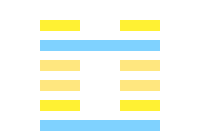
3.2.6 (3 > 61) - THE KUN HEXAGRAM
- 2. The second line, divided, shows (its subject) distressed and obliged to return; (even) the horses of her chariot (also) seem to be retreating. (But) not by a spoiler (is she assailed), but by one who seeks her to be his wife. The young lady maintains her firm correctness, and declines a union. After ten years she will be united, and have children.
- 6. The topmost line, divided, shows (its subject) with the horses of his chariot obliged to retreat, and weeping tears of blood in streams.
3.2.6 (3 > 61) - Seeing one's former companions again
One seizes the opportunity to be with those they prefer.
Bing DeepL Google Yandex3.2.6 (3 > 61) - Seeing one's former companions again
One seizes the opportunity to be with those they prefer.
Bing DeepL Google Yandex3.2.6 (3 > 61) - T’un, la difficulté initiale
T’un et tchun : A. 1. Bourgeon, pousse ; 2. Croissance, activité ; 3. Grandir, avancer. — B. Difficultés, arrêté dans son avancement, échec.
-
2. 2a. Tchun est comme arrêté par les difficultés, comme un cavalier dont le cheval veut reculer (ou : un cheval monté qui veut...).
2b. C’est comme la jeune fille qui veut épouser un brigand ravisseur, elle doit rester inébranlable et attendre (plutôt) dix ans. (Malgré cela), elle pourra alors se marier et être mère. (Il est ici question de difficultés.)
Un équipage solide, l’enfantement après dix ans indique le retour à la prospérité, à l’avancement. - 6. L’avancement, arrêté comme un cheval monté qui recule, fait répandre des larmes amères et abondantes.
3.2.6 (3 > 61) - Revoir ses anciens compagnons
On saisit sa chance pour être avec ceux que l'on préfère.
Bing DeepL Google Yandex3.2.6 (3 > 61) - Megoldás
- 2. Megbízható kapcsolatokat kell kialakítania mielőtt mások elfogadnák.
- 6. Egyedül folytatja tovább mert mások biztosítékokat akarnak mielőtt támogatnák a fejlesztéseket. Tétotvázás helyett meg kell változtatnia szomszédságát hogy túlléphessen a nehézségeken.

3.1.2.6 (3 > 59) - THE KUN HEXAGRAM
- 1. The first line, undivided, shows the difficulty (its subject has) in advancing. It will be advantageous for him to abide correct and firm; advantageous (also) to be made a feudal ruler.
- 2. The second line, divided, shows (its subject) distressed and obliged to return; (even) the horses of her chariot (also) seem to be retreating. (But) not by a spoiler (is she assailed), but by one who seeks her to be his wife. The young lady maintains her firm correctness, and declines a union. After ten years she will be united, and have children.
- 6. The topmost line, divided, shows (its subject) with the horses of his chariot obliged to retreat, and weeping tears of blood in streams.
3.1.2.6 (3 > 59) - Resolving difficulties
One anticipates violations of the expected conditions so they trust those who can adapt to them.
Bing DeepL Google Yandex3.1.2.6 (3 > 59) - Resolving difficulties
One anticipates violations of the expected conditions so they trust those who can adapt to them.
Bing DeepL Google Yandex3.1.2.6 (3 > 59) - T’un, la difficulté initiale
T’un et tchun : A. 1. Bourgeon, pousse ; 2. Croissance, activité ; 3. Grandir, avancer. — B. Difficultés, arrêté dans son avancement, échec.
- 1. Pour s’établir solidement, il faut se maintenir en fermeté et droiture. (Pour maintenir le royaume), il est bon de constituer des chefs féodaux. Bien qu’on ait des difficultés, la volonté doit toujours s’attacher au devoir. Si, bien qu’élevé, on condescend aux besoins des petits, on s’attachera fortement le peuple.
-
2. 2a. Tchun est comme arrêté par les difficultés, comme un cavalier dont le cheval veut reculer (ou : un cheval monté qui veut...).
2b. C’est comme la jeune fille qui veut épouser un brigand ravisseur, elle doit rester inébranlable et attendre (plutôt) dix ans. (Malgré cela), elle pourra alors se marier et être mère. (Il est ici question de difficultés.)
Un équipage solide, l’enfantement après dix ans indique le retour à la prospérité, à l’avancement. - 6. L’avancement, arrêté comme un cheval monté qui recule, fait répandre des larmes amères et abondantes.
3.1.2.6 (3 > 59) - Remédier aux difficultés
On prévoit des atteintes aux conditions prévues alors on se fie à ceux qui peuvent s'y adapter.
Bing DeepL Google Yandex3.1.2.6 (3 > 59) - Megoldás
- 1. Példamutató ha valaki mások segítségére siet a nehézségek ellenére.
- 2. Megbízható kapcsolatokat kell kialakítania mielőtt mások elfogadnák.
- 6. Egyedül folytatja tovább mert mások biztosítékokat akarnak mielőtt támogatnák a fejlesztéseket. Tétotvázás helyett meg kell változtatnia szomszédságát hogy túlléphessen a nehézségeken.
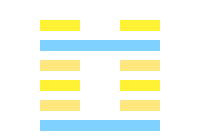
3.3.6 (3 > 37) - THE KUN HEXAGRAM
- 3. The third line, divided, shows one following the deer without (the guidance of) the forester, and only finding himself in the midst of the forest. The superior man, acquainted with the secret risks, thinks it better to give up the chase. If he went forward, he would regret it.
- 6. The topmost line, divided, shows (its subject) with the horses of his chariot obliged to retreat, and weeping tears of blood in streams.
3.3.6 (3 > 37) - Resolving difficulties
Others appear as ungrateful when they are offered something without giving anything in return.
Bing DeepL Google Yandex3.3.6 (3 > 37) - Resolving difficulties
Others appear as ungrateful when they are offered something without giving anything in return.
Bing DeepL Google Yandex3.3.6 (3 > 37) - T’un, la difficulté initiale
T’un et tchun : A. 1. Bourgeon, pousse ; 2. Croissance, activité ; 3. Grandir, avancer. — B. Difficultés, arrêté dans son avancement, échec.
-
3. Lorsque le gibier poursuivi s’enfonce inopinément dans une forêt profonde, le sage aime mieux l’abandonner que de s’exposer au danger. S’il l’y poursuit, il aura lieu de s’en repentir.
Il sera réduit à l’extrémité. - 6. L’avancement, arrêté comme un cheval monté qui recule, fait répandre des larmes amères et abondantes.
3.3.6 (3 > 37) - Remédier aux difficultés
Les autres passent pour des ingrats quand on leur donne quelque chose sans qu'ils ne proposent rien en échange.
Bing DeepL Google Yandex3.3.6 (3 > 37) - Megoldás
- 3. Magányosan halad ismeretlen terepen. Vezetőt kell keresnie vagy visszafordulnia.
- 6. Egyedül folytatja tovább mert mások biztosítékokat akarnak mielőtt támogatnák a fejlesztéseket. Tétotvázás helyett meg kell változtatnia szomszédságát hogy túlléphessen a nehézségeken.

3.1.3.6 (3 > 53) - THE KUN HEXAGRAM
- 1. The first line, undivided, shows the difficulty (its subject has) in advancing. It will be advantageous for him to abide correct and firm; advantageous (also) to be made a feudal ruler.
- 3. The third line, divided, shows one following the deer without (the guidance of) the forester, and only finding himself in the midst of the forest. The superior man, acquainted with the secret risks, thinks it better to give up the chase. If he went forward, he would regret it.
- 6. The topmost line, divided, shows (its subject) with the horses of his chariot obliged to retreat, and weeping tears of blood in streams.
3.1.3.6 (3 > 53) - Accepting mutual assistance
One assumes that they have sufficient resources to make an association.
Bing DeepL Google Yandex3.1.3.6 (3 > 53) - Accepting mutual assistance
One assumes that they have sufficient resources to make an association.
Bing DeepL Google Yandex3.1.3.6 (3 > 53) - T’un, la difficulté initiale
T’un et tchun : A. 1. Bourgeon, pousse ; 2. Croissance, activité ; 3. Grandir, avancer. — B. Difficultés, arrêté dans son avancement, échec.
- 1. Pour s’établir solidement, il faut se maintenir en fermeté et droiture. (Pour maintenir le royaume), il est bon de constituer des chefs féodaux. Bien qu’on ait des difficultés, la volonté doit toujours s’attacher au devoir. Si, bien qu’élevé, on condescend aux besoins des petits, on s’attachera fortement le peuple.
-
3. Lorsque le gibier poursuivi s’enfonce inopinément dans une forêt profonde, le sage aime mieux l’abandonner que de s’exposer au danger. S’il l’y poursuit, il aura lieu de s’en repentir.
Il sera réduit à l’extrémité. - 6. L’avancement, arrêté comme un cheval monté qui recule, fait répandre des larmes amères et abondantes.
3.1.3.6 (3 > 53) - Accepter l'entraide
On suppose que l'on a suffisamment de ressources pour former une association.
Bing DeepL Google Yandex3.1.3.6 (3 > 53) - Megoldás
- 1. Példamutató ha valaki mások segítségére siet a nehézségek ellenére.
- 3. Magányosan halad ismeretlen terepen. Vezetőt kell keresnie vagy visszafordulnia.
- 6. Egyedül folytatja tovább mert mások biztosítékokat akarnak mielőtt támogatnák a fejlesztéseket. Tétotvázás helyett meg kell változtatnia szomszédságát hogy túlléphessen a nehézségeken.
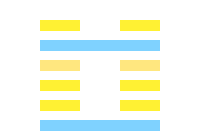
3.2.3.6 (3 > 9) - THE KUN HEXAGRAM
- 2. The second line, divided, shows (its subject) distressed and obliged to return; (even) the horses of her chariot (also) seem to be retreating. (But) not by a spoiler (is she assailed), but by one who seeks her to be his wife. The young lady maintains her firm correctness, and declines a union. After ten years she will be united, and have children.
- 3. The third line, divided, shows one following the deer without (the guidance of) the forester, and only finding himself in the midst of the forest. The superior man, acquainted with the secret risks, thinks it better to give up the chase. If he went forward, he would regret it.
- 6. The topmost line, divided, shows (its subject) with the horses of his chariot obliged to retreat, and weeping tears of blood in streams.
3.2.3.6 (3 > 9) - Resolving difficulties
One does the impossible to satisfy others.
Bing DeepL Google Yandex3.2.3.6 (3 > 9) - Resolving difficulties
One does the impossible to satisfy others.
Bing DeepL Google Yandex3.2.3.6 (3 > 9) - T’un, la difficulté initiale
T’un et tchun : A. 1. Bourgeon, pousse ; 2. Croissance, activité ; 3. Grandir, avancer. — B. Difficultés, arrêté dans son avancement, échec.
-
2. 2a. Tchun est comme arrêté par les difficultés, comme un cavalier dont le cheval veut reculer (ou : un cheval monté qui veut...).
2b. C’est comme la jeune fille qui veut épouser un brigand ravisseur, elle doit rester inébranlable et attendre (plutôt) dix ans. (Malgré cela), elle pourra alors se marier et être mère. (Il est ici question de difficultés.)
Un équipage solide, l’enfantement après dix ans indique le retour à la prospérité, à l’avancement. -
3. Lorsque le gibier poursuivi s’enfonce inopinément dans une forêt profonde, le sage aime mieux l’abandonner que de s’exposer au danger. S’il l’y poursuit, il aura lieu de s’en repentir.
Il sera réduit à l’extrémité. - 6. L’avancement, arrêté comme un cheval monté qui recule, fait répandre des larmes amères et abondantes.
3.2.3.6 (3 > 9) - Remédier aux difficultés
On fait l'impossible pour que les autres soient satisfaits.
Bing DeepL Google Yandex3.2.3.6 (3 > 9) - Megoldás
- 2. Megbízható kapcsolatokat kell kialakítania mielőtt mások elfogadnák.
- 3. Magányosan halad ismeretlen terepen. Vezetőt kell keresnie vagy visszafordulnia.
- 6. Egyedül folytatja tovább mert mások biztosítékokat akarnak mielőtt támogatnák a fejlesztéseket. Tétotvázás helyett meg kell változtatnia szomszédságát hogy túlléphessen a nehézségeken.

3.1.2.3.6 (3 > 57) - THE KUN HEXAGRAM
- 1. The first line, undivided, shows the difficulty (its subject has) in advancing. It will be advantageous for him to abide correct and firm; advantageous (also) to be made a feudal ruler.
- 2. The second line, divided, shows (its subject) distressed and obliged to return; (even) the horses of her chariot (also) seem to be retreating. (But) not by a spoiler (is she assailed), but by one who seeks her to be his wife. The young lady maintains her firm correctness, and declines a union. After ten years she will be united, and have children.
- 3. The third line, divided, shows one following the deer without (the guidance of) the forester, and only finding himself in the midst of the forest. The superior man, acquainted with the secret risks, thinks it better to give up the chase. If he went forward, he would regret it.
- 6. The topmost line, divided, shows (its subject) with the horses of his chariot obliged to retreat, and weeping tears of blood in streams.
3.1.2.3.6 (3 > 57) - Resolving difficulties
One is doing things that others have not deemed necessary.
Bing DeepL Google Yandex3.1.2.3.6 (3 > 57) - Resolving difficulties
One is doing things that others have not deemed necessary.
Bing DeepL Google Yandex3.1.2.3.6 (3 > 57) - T’un, la difficulté initiale
T’un et tchun : A. 1. Bourgeon, pousse ; 2. Croissance, activité ; 3. Grandir, avancer. — B. Difficultés, arrêté dans son avancement, échec.
- 1. Pour s’établir solidement, il faut se maintenir en fermeté et droiture. (Pour maintenir le royaume), il est bon de constituer des chefs féodaux. Bien qu’on ait des difficultés, la volonté doit toujours s’attacher au devoir. Si, bien qu’élevé, on condescend aux besoins des petits, on s’attachera fortement le peuple.
-
2. 2a. Tchun est comme arrêté par les difficultés, comme un cavalier dont le cheval veut reculer (ou : un cheval monté qui veut...).
2b. C’est comme la jeune fille qui veut épouser un brigand ravisseur, elle doit rester inébranlable et attendre (plutôt) dix ans. (Malgré cela), elle pourra alors se marier et être mère. (Il est ici question de difficultés.)
Un équipage solide, l’enfantement après dix ans indique le retour à la prospérité, à l’avancement. -
3. Lorsque le gibier poursuivi s’enfonce inopinément dans une forêt profonde, le sage aime mieux l’abandonner que de s’exposer au danger. S’il l’y poursuit, il aura lieu de s’en repentir.
Il sera réduit à l’extrémité. - 6. L’avancement, arrêté comme un cheval monté qui recule, fait répandre des larmes amères et abondantes.
3.1.2.3.6 (3 > 57) - Remédier aux difficultés
On fait des choses que les autres n'ont pas estimées nécessaires.
Bing DeepL Google Yandex3.1.2.3.6 (3 > 57) - Megoldás
- 1. Példamutató ha valaki mások segítségére siet a nehézségek ellenére.
- 2. Megbízható kapcsolatokat kell kialakítania mielőtt mások elfogadnák.
- 3. Magányosan halad ismeretlen terepen. Vezetőt kell keresnie vagy visszafordulnia.
- 6. Egyedül folytatja tovább mert mások biztosítékokat akarnak mielőtt támogatnák a fejlesztéseket. Tétotvázás helyett meg kell változtatnia szomszédságát hogy túlléphessen a nehézségeken.

3.4.6 (3 > 25) - THE KUN HEXAGRAM
- 4. The fourth line, divided, shows (its subject as a lady), the horses of whose chariot appear in retreat. She seeks, however, (the help of) him who seeks her to be his wife. Advance will be fortunate; all will turn out advantageously.
- 6. The topmost line, divided, shows (its subject) with the horses of his chariot obliged to retreat, and weeping tears of blood in streams.
3.4.6 (3 > 25) - Tagging the way
One marks their path so as to find their friends.
Bing DeepL Google Yandex3.4.6 (3 > 25) - Tagging the way
One marks their path so as to find their friends.
Bing DeepL Google Yandex3.4.6 (3 > 25) - T’un, la difficulté initiale
T’un et tchun : A. 1. Bourgeon, pousse ; 2. Croissance, activité ; 3. Grandir, avancer. — B. Difficultés, arrêté dans son avancement, échec.
-
4. Si elle est demandée en mariage selon les rites, qu’elle y aille et ce sera bien. Cela lui sera avantageux.
Il en est de même de l’équipage arrêté qui reprend sa course. - 6. L’avancement, arrêté comme un cheval monté qui recule, fait répandre des larmes amères et abondantes.
3.4.6 (3 > 25) - Baliser la route
On marque son chemin pour pouvoir retrouver ses amis.
Bing DeepL Google Yandex3.4.6 (3 > 25) - Megoldás
- 4. Segítséget kap ha kivárja a sorát.
- 6. Egyedül folytatja tovább mert mások biztosítékokat akarnak mielőtt támogatnák a fejlesztéseket. Tétotvázás helyett meg kell változtatnia szomszédságát hogy túlléphessen a nehézségeken.

3.1.4.6 (3 > 12) - THE KUN HEXAGRAM
- 1. The first line, undivided, shows the difficulty (its subject has) in advancing. It will be advantageous for him to abide correct and firm; advantageous (also) to be made a feudal ruler.
- 4. The fourth line, divided, shows (its subject as a lady), the horses of whose chariot appear in retreat. She seeks, however, (the help of) him who seeks her to be his wife. Advance will be fortunate; all will turn out advantageously.
- 6. The topmost line, divided, shows (its subject) with the horses of his chariot obliged to retreat, and weeping tears of blood in streams.
3.1.4.6 (3 > 12) - Assuming one's sins
One is not going to be caught red-handed when they have done nothing.
Bing DeepL Google Yandex3.1.4.6 (3 > 12) - Assuming one's sins
One is not going to be caught red-handed when they have done nothing.
Bing DeepL Google Yandex3.1.4.6 (3 > 12) - T’un, la difficulté initiale
T’un et tchun : A. 1. Bourgeon, pousse ; 2. Croissance, activité ; 3. Grandir, avancer. — B. Difficultés, arrêté dans son avancement, échec.
- 1. Pour s’établir solidement, il faut se maintenir en fermeté et droiture. (Pour maintenir le royaume), il est bon de constituer des chefs féodaux. Bien qu’on ait des difficultés, la volonté doit toujours s’attacher au devoir. Si, bien qu’élevé, on condescend aux besoins des petits, on s’attachera fortement le peuple.
-
4. Si elle est demandée en mariage selon les rites, qu’elle y aille et ce sera bien. Cela lui sera avantageux.
Il en est de même de l’équipage arrêté qui reprend sa course. - 6. L’avancement, arrêté comme un cheval monté qui recule, fait répandre des larmes amères et abondantes.
3.1.4.6 (3 > 12) - Assumer ses péchés
On ne va pas se faire prendre en flagrant délit quand on n'a rien fait.
Bing DeepL Google Yandex3.1.4.6 (3 > 12) - Megoldás
- 1. Példamutató ha valaki mások segítségére siet a nehézségek ellenére.
- 4. Segítséget kap ha kivárja a sorát.
- 6. Egyedül folytatja tovább mert mások biztosítékokat akarnak mielőtt támogatnák a fejlesztéseket. Tétotvázás helyett meg kell változtatnia szomszédságát hogy túlléphessen a nehézségeken.

3.2.4.6 (3 > 10) - THE KUN HEXAGRAM
- 2. The second line, divided, shows (its subject) distressed and obliged to return; (even) the horses of her chariot (also) seem to be retreating. (But) not by a spoiler (is she assailed), but by one who seeks her to be his wife. The young lady maintains her firm correctness, and declines a union. After ten years she will be united, and have children.
- 4. The fourth line, divided, shows (its subject as a lady), the horses of whose chariot appear in retreat. She seeks, however, (the help of) him who seeks her to be his wife. Advance will be fortunate; all will turn out advantageously.
- 6. The topmost line, divided, shows (its subject) with the horses of his chariot obliged to retreat, and weeping tears of blood in streams.
3.2.4.6 (3 > 10) - Resolving difficulties
One asks others to be silent when they talk.
Bing DeepL Google Yandex3.2.4.6 (3 > 10) - Resolving difficulties
One asks others to be silent when they talk.
Bing DeepL Google Yandex3.2.4.6 (3 > 10) - T’un, la difficulté initiale
T’un et tchun : A. 1. Bourgeon, pousse ; 2. Croissance, activité ; 3. Grandir, avancer. — B. Difficultés, arrêté dans son avancement, échec.
-
2. 2a. Tchun est comme arrêté par les difficultés, comme un cavalier dont le cheval veut reculer (ou : un cheval monté qui veut...).
2b. C’est comme la jeune fille qui veut épouser un brigand ravisseur, elle doit rester inébranlable et attendre (plutôt) dix ans. (Malgré cela), elle pourra alors se marier et être mère. (Il est ici question de difficultés.)
Un équipage solide, l’enfantement après dix ans indique le retour à la prospérité, à l’avancement. -
4. Si elle est demandée en mariage selon les rites, qu’elle y aille et ce sera bien. Cela lui sera avantageux.
Il en est de même de l’équipage arrêté qui reprend sa course. - 6. L’avancement, arrêté comme un cheval monté qui recule, fait répandre des larmes amères et abondantes.
3.2.4.6 (3 > 10) - Remédier aux difficultés
On demande aux autres de se taire quand on parle.
Bing DeepL Google Yandex3.2.4.6 (3 > 10) - Megoldás
- 2. Megbízható kapcsolatokat kell kialakítania mielőtt mások elfogadnák.
- 4. Segítséget kap ha kivárja a sorát.
- 6. Egyedül folytatja tovább mert mások biztosítékokat akarnak mielőtt támogatnák a fejlesztéseket. Tétotvázás helyett meg kell változtatnia szomszédságát hogy túlléphessen a nehézségeken.

3.1.2.4.6 (3 > 6) - THE KUN HEXAGRAM
- 1. The first line, undivided, shows the difficulty (its subject has) in advancing. It will be advantageous for him to abide correct and firm; advantageous (also) to be made a feudal ruler.
- 2. The second line, divided, shows (its subject) distressed and obliged to return; (even) the horses of her chariot (also) seem to be retreating. (But) not by a spoiler (is she assailed), but by one who seeks her to be his wife. The young lady maintains her firm correctness, and declines a union. After ten years she will be united, and have children.
- 4. The fourth line, divided, shows (its subject as a lady), the horses of whose chariot appear in retreat. She seeks, however, (the help of) him who seeks her to be his wife. Advance will be fortunate; all will turn out advantageously.
- 6. The topmost line, divided, shows (its subject) with the horses of his chariot obliged to retreat, and weeping tears of blood in streams.
3.1.2.4.6 (3 > 6) - Recalling the victories of the past
One continues, remembering that others have already succeeded.
Bing DeepL Google Yandex3.1.2.4.6 (3 > 6) - Recalling the victories of the past
One continues, remembering that others have already succeeded.
Bing DeepL Google Yandex3.1.2.4.6 (3 > 6) - T’un, la difficulté initiale
T’un et tchun : A. 1. Bourgeon, pousse ; 2. Croissance, activité ; 3. Grandir, avancer. — B. Difficultés, arrêté dans son avancement, échec.
- 1. Pour s’établir solidement, il faut se maintenir en fermeté et droiture. (Pour maintenir le royaume), il est bon de constituer des chefs féodaux. Bien qu’on ait des difficultés, la volonté doit toujours s’attacher au devoir. Si, bien qu’élevé, on condescend aux besoins des petits, on s’attachera fortement le peuple.
-
2. 2a. Tchun est comme arrêté par les difficultés, comme un cavalier dont le cheval veut reculer (ou : un cheval monté qui veut...).
2b. C’est comme la jeune fille qui veut épouser un brigand ravisseur, elle doit rester inébranlable et attendre (plutôt) dix ans. (Malgré cela), elle pourra alors se marier et être mère. (Il est ici question de difficultés.)
Un équipage solide, l’enfantement après dix ans indique le retour à la prospérité, à l’avancement. -
4. Si elle est demandée en mariage selon les rites, qu’elle y aille et ce sera bien. Cela lui sera avantageux.
Il en est de même de l’équipage arrêté qui reprend sa course. - 6. L’avancement, arrêté comme un cheval monté qui recule, fait répandre des larmes amères et abondantes.
3.1.2.4.6 (3 > 6) - Se rappeler les victoires du passé
On continue en se souvenant que les autres y sont déjà parvenus.
Bing DeepL Google Yandex3.1.2.4.6 (3 > 6) - Megoldás
- 1. Példamutató ha valaki mások segítségére siet a nehézségek ellenére.
- 2. Megbízható kapcsolatokat kell kialakítania mielőtt mások elfogadnák.
- 4. Segítséget kap ha kivárja a sorát.
- 6. Egyedül folytatja tovább mert mások biztosítékokat akarnak mielőtt támogatnák a fejlesztéseket. Tétotvázás helyett meg kell változtatnia szomszédságát hogy túlléphessen a nehézségeken.

3.3.4.6 (3 > 13) - THE KUN HEXAGRAM
- 3. The third line, divided, shows one following the deer without (the guidance of) the forester, and only finding himself in the midst of the forest. The superior man, acquainted with the secret risks, thinks it better to give up the chase. If he went forward, he would regret it.
- 4. The fourth line, divided, shows (its subject as a lady), the horses of whose chariot appear in retreat. She seeks, however, (the help of) him who seeks her to be his wife. Advance will be fortunate; all will turn out advantageously.
- 6. The topmost line, divided, shows (its subject) with the horses of his chariot obliged to retreat, and weeping tears of blood in streams.
3.3.4.6 (3 > 13) - Resolving difficulties
One thinks about preparing apologies for those who could not join the group.
Bing DeepL Google Yandex3.3.4.6 (3 > 13) - Resolving difficulties
One thinks about preparing apologies for those who could not join the group.
Bing DeepL Google Yandex3.3.4.6 (3 > 13) - T’un, la difficulté initiale
T’un et tchun : A. 1. Bourgeon, pousse ; 2. Croissance, activité ; 3. Grandir, avancer. — B. Difficultés, arrêté dans son avancement, échec.
-
3. Lorsque le gibier poursuivi s’enfonce inopinément dans une forêt profonde, le sage aime mieux l’abandonner que de s’exposer au danger. S’il l’y poursuit, il aura lieu de s’en repentir.
Il sera réduit à l’extrémité. -
4. Si elle est demandée en mariage selon les rites, qu’elle y aille et ce sera bien. Cela lui sera avantageux.
Il en est de même de l’équipage arrêté qui reprend sa course. - 6. L’avancement, arrêté comme un cheval monté qui recule, fait répandre des larmes amères et abondantes.
3.3.4.6 (3 > 13) - Remédier aux difficultés
On pense à préparer des excuses pour ceux qui n'ont pas pu rejoindre le groupe.
Bing DeepL Google Yandex3.3.4.6 (3 > 13) - Megoldás
- 3. Magányosan halad ismeretlen terepen. Vezetőt kell keresnie vagy visszafordulnia.
- 4. Segítséget kap ha kivárja a sorát.
- 6. Egyedül folytatja tovább mert mások biztosítékokat akarnak mielőtt támogatnák a fejlesztéseket. Tétotvázás helyett meg kell változtatnia szomszédságát hogy túlléphessen a nehézségeken.

3.1.3.4.6 (3 > 33) - THE KUN HEXAGRAM
- 1. The first line, undivided, shows the difficulty (its subject has) in advancing. It will be advantageous for him to abide correct and firm; advantageous (also) to be made a feudal ruler.
- 3. The third line, divided, shows one following the deer without (the guidance of) the forester, and only finding himself in the midst of the forest. The superior man, acquainted with the secret risks, thinks it better to give up the chase. If he went forward, he would regret it.
- 4. The fourth line, divided, shows (its subject as a lady), the horses of whose chariot appear in retreat. She seeks, however, (the help of) him who seeks her to be his wife. Advance will be fortunate; all will turn out advantageously.
- 6. The topmost line, divided, shows (its subject) with the horses of his chariot obliged to retreat, and weeping tears of blood in streams.
3.1.3.4.6 (3 > 33) - Resolving difficulties
One makes their own a motto that they have heard elsewhere.
Bing DeepL Google Yandex3.1.3.4.6 (3 > 33) - Resolving difficulties
One makes their own a motto that they have heard elsewhere.
Bing DeepL Google Yandex3.1.3.4.6 (3 > 33) - T’un, la difficulté initiale
T’un et tchun : A. 1. Bourgeon, pousse ; 2. Croissance, activité ; 3. Grandir, avancer. — B. Difficultés, arrêté dans son avancement, échec.
- 1. Pour s’établir solidement, il faut se maintenir en fermeté et droiture. (Pour maintenir le royaume), il est bon de constituer des chefs féodaux. Bien qu’on ait des difficultés, la volonté doit toujours s’attacher au devoir. Si, bien qu’élevé, on condescend aux besoins des petits, on s’attachera fortement le peuple.
-
3. Lorsque le gibier poursuivi s’enfonce inopinément dans une forêt profonde, le sage aime mieux l’abandonner que de s’exposer au danger. S’il l’y poursuit, il aura lieu de s’en repentir.
Il sera réduit à l’extrémité. -
4. Si elle est demandée en mariage selon les rites, qu’elle y aille et ce sera bien. Cela lui sera avantageux.
Il en est de même de l’équipage arrêté qui reprend sa course. - 6. L’avancement, arrêté comme un cheval monté qui recule, fait répandre des larmes amères et abondantes.
3.1.3.4.6 (3 > 33) - Remédier aux difficultés
On fait sienne une devise que l'on a entendue ailleurs.
Bing DeepL Google Yandex3.1.3.4.6 (3 > 33) - Megoldás
- 1. Példamutató ha valaki mások segítségére siet a nehézségek ellenére.
- 3. Magányosan halad ismeretlen terepen. Vezetőt kell keresnie vagy visszafordulnia.
- 4. Segítséget kap ha kivárja a sorát.
- 6. Egyedül folytatja tovább mert mások biztosítékokat akarnak mielőtt támogatnák a fejlesztéseket. Tétotvázás helyett meg kell változtatnia szomszédságát hogy túlléphessen a nehézségeken.
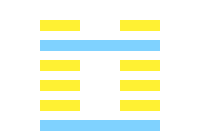
3.2.3.4.6 (3 > 1) - THE KUN HEXAGRAM
- 2. The second line, divided, shows (its subject) distressed and obliged to return; (even) the horses of her chariot (also) seem to be retreating. (But) not by a spoiler (is she assailed), but by one who seeks her to be his wife. The young lady maintains her firm correctness, and declines a union. After ten years she will be united, and have children.
- 3. The third line, divided, shows one following the deer without (the guidance of) the forester, and only finding himself in the midst of the forest. The superior man, acquainted with the secret risks, thinks it better to give up the chase. If he went forward, he would regret it.
- 4. The fourth line, divided, shows (its subject as a lady), the horses of whose chariot appear in retreat. She seeks, however, (the help of) him who seeks her to be his wife. Advance will be fortunate; all will turn out advantageously.
- 6. The topmost line, divided, shows (its subject) with the horses of his chariot obliged to retreat, and weeping tears of blood in streams.
3.2.3.4.6 (3 > 1) - Overcoming one's fears
One needs to question the others before they can free oneself from their anxieties.
Bing DeepL Google Yandex3.2.3.4.6 (3 > 1) - Overcoming one's fears
One needs to question the others before they can free oneself from their anxieties.
Bing DeepL Google Yandex3.2.3.4.6 (3 > 1) - T’un, la difficulté initiale
T’un et tchun : A. 1. Bourgeon, pousse ; 2. Croissance, activité ; 3. Grandir, avancer. — B. Difficultés, arrêté dans son avancement, échec.
-
2. 2a. Tchun est comme arrêté par les difficultés, comme un cavalier dont le cheval veut reculer (ou : un cheval monté qui veut...).
2b. C’est comme la jeune fille qui veut épouser un brigand ravisseur, elle doit rester inébranlable et attendre (plutôt) dix ans. (Malgré cela), elle pourra alors se marier et être mère. (Il est ici question de difficultés.)
Un équipage solide, l’enfantement après dix ans indique le retour à la prospérité, à l’avancement. -
3. Lorsque le gibier poursuivi s’enfonce inopinément dans une forêt profonde, le sage aime mieux l’abandonner que de s’exposer au danger. S’il l’y poursuit, il aura lieu de s’en repentir.
Il sera réduit à l’extrémité. -
4. Si elle est demandée en mariage selon les rites, qu’elle y aille et ce sera bien. Cela lui sera avantageux.
Il en est de même de l’équipage arrêté qui reprend sa course. - 6. L’avancement, arrêté comme un cheval monté qui recule, fait répandre des larmes amères et abondantes.
3.2.3.4.6 (3 > 1) - Surmonter ses craintes
On doit interroger les autres avant de pouvoir se libérer de ses angoisses.
Bing DeepL Google Yandex3.2.3.4.6 (3 > 1) - Megoldás
- 2. Megbízható kapcsolatokat kell kialakítania mielőtt mások elfogadnák.
- 3. Magányosan halad ismeretlen terepen. Vezetőt kell keresnie vagy visszafordulnia.
- 4. Segítséget kap ha kivárja a sorát.
- 6. Egyedül folytatja tovább mert mások biztosítékokat akarnak mielőtt támogatnák a fejlesztéseket. Tétotvázás helyett meg kell változtatnia szomszédságát hogy túlléphessen a nehézségeken.

3.1.2.3.4.6 (3 > 44) - THE KUN HEXAGRAM
- 1. The first line, undivided, shows the difficulty (its subject has) in advancing. It will be advantageous for him to abide correct and firm; advantageous (also) to be made a feudal ruler.
- 2. The second line, divided, shows (its subject) distressed and obliged to return; (even) the horses of her chariot (also) seem to be retreating. (But) not by a spoiler (is she assailed), but by one who seeks her to be his wife. The young lady maintains her firm correctness, and declines a union. After ten years she will be united, and have children.
- 3. The third line, divided, shows one following the deer without (the guidance of) the forester, and only finding himself in the midst of the forest. The superior man, acquainted with the secret risks, thinks it better to give up the chase. If he went forward, he would regret it.
- 4. The fourth line, divided, shows (its subject as a lady), the horses of whose chariot appear in retreat. She seeks, however, (the help of) him who seeks her to be his wife. Advance will be fortunate; all will turn out advantageously.
- 6. The topmost line, divided, shows (its subject) with the horses of his chariot obliged to retreat, and weeping tears of blood in streams.
3.1.2.3.4.6 (3 > 44) - Resolving difficulties
One becomes a schemer to indulge their most guilty instincts.
Bing DeepL Google Yandex3.1.2.3.4.6 (3 > 44) - Resolving difficulties
One becomes a schemer to indulge their most guilty instincts.
Bing DeepL Google Yandex3.1.2.3.4.6 (3 > 44) - T’un, la difficulté initiale
T’un et tchun : A. 1. Bourgeon, pousse ; 2. Croissance, activité ; 3. Grandir, avancer. — B. Difficultés, arrêté dans son avancement, échec.
- 1. Pour s’établir solidement, il faut se maintenir en fermeté et droiture. (Pour maintenir le royaume), il est bon de constituer des chefs féodaux. Bien qu’on ait des difficultés, la volonté doit toujours s’attacher au devoir. Si, bien qu’élevé, on condescend aux besoins des petits, on s’attachera fortement le peuple.
-
2. 2a. Tchun est comme arrêté par les difficultés, comme un cavalier dont le cheval veut reculer (ou : un cheval monté qui veut...).
2b. C’est comme la jeune fille qui veut épouser un brigand ravisseur, elle doit rester inébranlable et attendre (plutôt) dix ans. (Malgré cela), elle pourra alors se marier et être mère. (Il est ici question de difficultés.)
Un équipage solide, l’enfantement après dix ans indique le retour à la prospérité, à l’avancement. -
3. Lorsque le gibier poursuivi s’enfonce inopinément dans une forêt profonde, le sage aime mieux l’abandonner que de s’exposer au danger. S’il l’y poursuit, il aura lieu de s’en repentir.
Il sera réduit à l’extrémité. -
4. Si elle est demandée en mariage selon les rites, qu’elle y aille et ce sera bien. Cela lui sera avantageux.
Il en est de même de l’équipage arrêté qui reprend sa course. - 6. L’avancement, arrêté comme un cheval monté qui recule, fait répandre des larmes amères et abondantes.
3.1.2.3.4.6 (3 > 44) - Remédier aux difficultés
On devient intriguant pour satisfaire ses instincts les plus coupables.
Bing DeepL Google Yandex3.1.2.3.4.6 (3 > 44) - Megoldás
- 1. Példamutató ha valaki mások segítségére siet a nehézségek ellenére.
- 2. Megbízható kapcsolatokat kell kialakítania mielőtt mások elfogadnák.
- 3. Magányosan halad ismeretlen terepen. Vezetőt kell keresnie vagy visszafordulnia.
- 4. Segítséget kap ha kivárja a sorát.
- 6. Egyedül folytatja tovább mert mások biztosítékokat akarnak mielőtt támogatnák a fejlesztéseket. Tétotvázás helyett meg kell változtatnia szomszédságát hogy túlléphessen a nehézségeken.

3.5.6 (3 > 27) - THE KUN HEXAGRAM
- 5. The fifth line, undivided, shows the difficulties in the way of (its subject's) dispensing the rich favours that might be expected from him. With firmness and correctness there will be good fortune in small things; (even) with them in great things there will be evil.
- 6. The topmost line, divided, shows (its subject) with the horses of his chariot obliged to retreat, and weeping tears of blood in streams.
3.5.6 (3 > 27) - Inquiring to understand
One thinks they know what others are going to do when they should ask them.
Bing DeepL Google Yandex3.5.6 (3 > 27) - Inquiring to understand
One thinks they know what others are going to do when they should ask them.
Bing DeepL Google Yandex3.5.6 (3 > 27) - T’un, la difficulté initiale
T’un et tchun : A. 1. Bourgeon, pousse ; 2. Croissance, activité ; 3. Grandir, avancer. — B. Difficultés, arrêté dans son avancement, échec.
-
5. Dans le développement de la sève des bourgeons, si elle se répand modérément, la croissance sera heureuse ; si elle se répand trop, le croissance sera empêchée.
Il en est ainsi si elle se répand avant d’être suffisamment riche et forte.
Obstacle au développement : s’il est petit, l’issue peut être heureuse ; s’il est grand, fin malheureuse. - 6. L’avancement, arrêté comme un cheval monté qui recule, fait répandre des larmes amères et abondantes.
3.5.6 (3 > 27) - Se renseigner pour comprendre
On croit savoir ce que les autres vont faire alors qu'on devrait leur demander.
Bing DeepL Google Yandex3.5.6 (3 > 27) - Megoldás
- 5. Tudni akar mielőtt döntene.
- 6. Egyedül folytatja tovább mert mások biztosítékokat akarnak mielőtt támogatnák a fejlesztéseket. Tétotvázás helyett meg kell változtatnia szomszédságát hogy túlléphessen a nehézségeken.
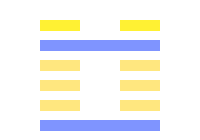
3.1.5.6 (3 > 23) - THE KUN HEXAGRAM
- 1. The first line, undivided, shows the difficulty (its subject has) in advancing. It will be advantageous for him to abide correct and firm; advantageous (also) to be made a feudal ruler.
- 5. The fifth line, undivided, shows the difficulties in the way of (its subject's) dispensing the rich favours that might be expected from him. With firmness and correctness there will be good fortune in small things; (even) with them in great things there will be evil.
- 6. The topmost line, divided, shows (its subject) with the horses of his chariot obliged to retreat, and weeping tears of blood in streams.
3.1.5.6 (3 > 23) - Imitating the winners
One will embrace the methods that succeed in others.
Bing DeepL Google Yandex3.1.5.6 (3 > 23) - Imitating the winners
One will embrace the methods that succeed in others.
Bing DeepL Google Yandex3.1.5.6 (3 > 23) - T’un, la difficulté initiale
T’un et tchun : A. 1. Bourgeon, pousse ; 2. Croissance, activité ; 3. Grandir, avancer. — B. Difficultés, arrêté dans son avancement, échec.
- 1. Pour s’établir solidement, il faut se maintenir en fermeté et droiture. (Pour maintenir le royaume), il est bon de constituer des chefs féodaux. Bien qu’on ait des difficultés, la volonté doit toujours s’attacher au devoir. Si, bien qu’élevé, on condescend aux besoins des petits, on s’attachera fortement le peuple.
-
5. Dans le développement de la sève des bourgeons, si elle se répand modérément, la croissance sera heureuse ; si elle se répand trop, le croissance sera empêchée.
Il en est ainsi si elle se répand avant d’être suffisamment riche et forte.
Obstacle au développement : s’il est petit, l’issue peut être heureuse ; s’il est grand, fin malheureuse. - 6. L’avancement, arrêté comme un cheval monté qui recule, fait répandre des larmes amères et abondantes.
3.1.5.6 (3 > 23) - Imiter les vainqueurs
On va faire siennes les méthodes qui réussissent chez les autres.
Bing DeepL Google Yandex3.1.5.6 (3 > 23) - Megoldás
- 1. Példamutató ha valaki mások segítségére siet a nehézségek ellenére.
- 5. Tudni akar mielőtt döntene.
- 6. Egyedül folytatja tovább mert mások biztosítékokat akarnak mielőtt támogatnák a fejlesztéseket. Tétotvázás helyett meg kell változtatnia szomszédságát hogy túlléphessen a nehézségeken.

3.2.5.6 (3 > 41) - THE KUN HEXAGRAM
- 2. The second line, divided, shows (its subject) distressed and obliged to return; (even) the horses of her chariot (also) seem to be retreating. (But) not by a spoiler (is she assailed), but by one who seeks her to be his wife. The young lady maintains her firm correctness, and declines a union. After ten years she will be united, and have children.
- 5. The fifth line, undivided, shows the difficulties in the way of (its subject's) dispensing the rich favours that might be expected from him. With firmness and correctness there will be good fortune in small things; (even) with them in great things there will be evil.
- 6. The topmost line, divided, shows (its subject) with the horses of his chariot obliged to retreat, and weeping tears of blood in streams.
3.2.5.6 (3 > 41) - Relaxing before having fun
One does their best when they have little time for their hobbies.
Bing DeepL Google Yandex3.2.5.6 (3 > 41) - Relaxing before having fun
One does their best when they have little time for their hobbies.
Bing DeepL Google Yandex3.2.5.6 (3 > 41) - T’un, la difficulté initiale
T’un et tchun : A. 1. Bourgeon, pousse ; 2. Croissance, activité ; 3. Grandir, avancer. — B. Difficultés, arrêté dans son avancement, échec.
-
2. 2a. Tchun est comme arrêté par les difficultés, comme un cavalier dont le cheval veut reculer (ou : un cheval monté qui veut...).
2b. C’est comme la jeune fille qui veut épouser un brigand ravisseur, elle doit rester inébranlable et attendre (plutôt) dix ans. (Malgré cela), elle pourra alors se marier et être mère. (Il est ici question de difficultés.)
Un équipage solide, l’enfantement après dix ans indique le retour à la prospérité, à l’avancement. -
5. Dans le développement de la sève des bourgeons, si elle se répand modérément, la croissance sera heureuse ; si elle se répand trop, le croissance sera empêchée.
Il en est ainsi si elle se répand avant d’être suffisamment riche et forte.
Obstacle au développement : s’il est petit, l’issue peut être heureuse ; s’il est grand, fin malheureuse. - 6. L’avancement, arrêté comme un cheval monté qui recule, fait répandre des larmes amères et abondantes.
3.2.5.6 (3 > 41) - Se reposer avant de se distraire
On fait de son mieux quand on a peu de temps à consacrer à ses loisirs.
Bing DeepL Google Yandex3.2.5.6 (3 > 41) - Megoldás
- 2. Megbízható kapcsolatokat kell kialakítania mielőtt mások elfogadnák.
- 5. Tudni akar mielőtt döntene.
- 6. Egyedül folytatja tovább mert mások biztosítékokat akarnak mielőtt támogatnák a fejlesztéseket. Tétotvázás helyett meg kell változtatnia szomszédságát hogy túlléphessen a nehézségeken.
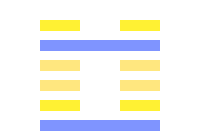
3.1.2.5.6 (3 > 4) - THE KUN HEXAGRAM
- 1. The first line, undivided, shows the difficulty (its subject has) in advancing. It will be advantageous for him to abide correct and firm; advantageous (also) to be made a feudal ruler.
- 2. The second line, divided, shows (its subject) distressed and obliged to return; (even) the horses of her chariot (also) seem to be retreating. (But) not by a spoiler (is she assailed), but by one who seeks her to be his wife. The young lady maintains her firm correctness, and declines a union. After ten years she will be united, and have children.
- 5. The fifth line, undivided, shows the difficulties in the way of (its subject's) dispensing the rich favours that might be expected from him. With firmness and correctness there will be good fortune in small things; (even) with them in great things there will be evil.
- 6. The topmost line, divided, shows (its subject) with the horses of his chariot obliged to retreat, and weeping tears of blood in streams.
3.1.2.5.6 (3 > 4) - Resolving difficulties
One prepares their shot well before the others are aware.
Bing DeepL Google Yandex3.1.2.5.6 (3 > 4) - Resolving difficulties
One prepares their shot well before the others are aware.
Bing DeepL Google Yandex3.1.2.5.6 (3 > 4) - T’un, la difficulté initiale
T’un et tchun : A. 1. Bourgeon, pousse ; 2. Croissance, activité ; 3. Grandir, avancer. — B. Difficultés, arrêté dans son avancement, échec.
- 1. Pour s’établir solidement, il faut se maintenir en fermeté et droiture. (Pour maintenir le royaume), il est bon de constituer des chefs féodaux. Bien qu’on ait des difficultés, la volonté doit toujours s’attacher au devoir. Si, bien qu’élevé, on condescend aux besoins des petits, on s’attachera fortement le peuple.
-
2. 2a. Tchun est comme arrêté par les difficultés, comme un cavalier dont le cheval veut reculer (ou : un cheval monté qui veut...).
2b. C’est comme la jeune fille qui veut épouser un brigand ravisseur, elle doit rester inébranlable et attendre (plutôt) dix ans. (Malgré cela), elle pourra alors se marier et être mère. (Il est ici question de difficultés.)
Un équipage solide, l’enfantement après dix ans indique le retour à la prospérité, à l’avancement. -
5. Dans le développement de la sève des bourgeons, si elle se répand modérément, la croissance sera heureuse ; si elle se répand trop, le croissance sera empêchée.
Il en est ainsi si elle se répand avant d’être suffisamment riche et forte.
Obstacle au développement : s’il est petit, l’issue peut être heureuse ; s’il est grand, fin malheureuse. - 6. L’avancement, arrêté comme un cheval monté qui recule, fait répandre des larmes amères et abondantes.
3.1.2.5.6 (3 > 4) - Remédier aux difficultés
On prépare son coup bien avant que les autres ne soient au courant.
Bing DeepL Google Yandex3.1.2.5.6 (3 > 4) - Megoldás
- 1. Példamutató ha valaki mások segítségére siet a nehézségek ellenére.
- 2. Megbízható kapcsolatokat kell kialakítania mielőtt mások elfogadnák.
- 5. Tudni akar mielőtt döntene.
- 6. Egyedül folytatja tovább mert mások biztosítékokat akarnak mielőtt támogatnák a fejlesztéseket. Tétotvázás helyett meg kell változtatnia szomszédságát hogy túlléphessen a nehézségeken.

3.3.5.6 (3 > 22) - THE KUN HEXAGRAM
- 3. The third line, divided, shows one following the deer without (the guidance of) the forester, and only finding himself in the midst of the forest. The superior man, acquainted with the secret risks, thinks it better to give up the chase. If he went forward, he would regret it.
- 5. The fifth line, undivided, shows the difficulties in the way of (its subject's) dispensing the rich favours that might be expected from him. With firmness and correctness there will be good fortune in small things; (even) with them in great things there will be evil.
- 6. The topmost line, divided, shows (its subject) with the horses of his chariot obliged to retreat, and weeping tears of blood in streams.
3.3.5.6 (3 > 22) - Being suspicious of everything
One does as if others had no chance of becoming trustworthy.
Bing DeepL Google Yandex3.3.5.6 (3 > 22) - Being suspicious of everything
One does as if others had no chance of becoming trustworthy.
Bing DeepL Google Yandex3.3.5.6 (3 > 22) - T’un, la difficulté initiale
T’un et tchun : A. 1. Bourgeon, pousse ; 2. Croissance, activité ; 3. Grandir, avancer. — B. Difficultés, arrêté dans son avancement, échec.
-
3. Lorsque le gibier poursuivi s’enfonce inopinément dans une forêt profonde, le sage aime mieux l’abandonner que de s’exposer au danger. S’il l’y poursuit, il aura lieu de s’en repentir.
Il sera réduit à l’extrémité. -
5. Dans le développement de la sève des bourgeons, si elle se répand modérément, la croissance sera heureuse ; si elle se répand trop, le croissance sera empêchée.
Il en est ainsi si elle se répand avant d’être suffisamment riche et forte.
Obstacle au développement : s’il est petit, l’issue peut être heureuse ; s’il est grand, fin malheureuse. - 6. L’avancement, arrêté comme un cheval monté qui recule, fait répandre des larmes amères et abondantes.
3.3.5.6 (3 > 22) - Se méfier de tout
On fait comme si les autres n'avaient aucune chance de devenir dignes de confiance.
Bing DeepL Google Yandex3.3.5.6 (3 > 22) - Megoldás
- 3. Magányosan halad ismeretlen terepen. Vezetőt kell keresnie vagy visszafordulnia.
- 5. Tudni akar mielőtt döntene.
- 6. Egyedül folytatja tovább mert mások biztosítékokat akarnak mielőtt támogatnák a fejlesztéseket. Tétotvázás helyett meg kell változtatnia szomszédságát hogy túlléphessen a nehézségeken.
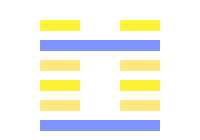
3.1.3.5.6 (3 > 52) - THE KUN HEXAGRAM
- 1. The first line, undivided, shows the difficulty (its subject has) in advancing. It will be advantageous for him to abide correct and firm; advantageous (also) to be made a feudal ruler.
- 3. The third line, divided, shows one following the deer without (the guidance of) the forester, and only finding himself in the midst of the forest. The superior man, acquainted with the secret risks, thinks it better to give up the chase. If he went forward, he would regret it.
- 5. The fifth line, undivided, shows the difficulties in the way of (its subject's) dispensing the rich favours that might be expected from him. With firmness and correctness there will be good fortune in small things; (even) with them in great things there will be evil.
- 6. The topmost line, divided, shows (its subject) with the horses of his chariot obliged to retreat, and weeping tears of blood in streams.
3.1.3.5.6 (3 > 52) - Revealing a conspiracy
One receives evidence that shows that they may have been betrayed.
Bing DeepL Google Yandex3.1.3.5.6 (3 > 52) - Revealing a conspiracy
One receives evidence that shows that they may have been betrayed.
Bing DeepL Google Yandex3.1.3.5.6 (3 > 52) - T’un, la difficulté initiale
T’un et tchun : A. 1. Bourgeon, pousse ; 2. Croissance, activité ; 3. Grandir, avancer. — B. Difficultés, arrêté dans son avancement, échec.
- 1. Pour s’établir solidement, il faut se maintenir en fermeté et droiture. (Pour maintenir le royaume), il est bon de constituer des chefs féodaux. Bien qu’on ait des difficultés, la volonté doit toujours s’attacher au devoir. Si, bien qu’élevé, on condescend aux besoins des petits, on s’attachera fortement le peuple.
-
3. Lorsque le gibier poursuivi s’enfonce inopinément dans une forêt profonde, le sage aime mieux l’abandonner que de s’exposer au danger. S’il l’y poursuit, il aura lieu de s’en repentir.
Il sera réduit à l’extrémité. -
5. Dans le développement de la sève des bourgeons, si elle se répand modérément, la croissance sera heureuse ; si elle se répand trop, le croissance sera empêchée.
Il en est ainsi si elle se répand avant d’être suffisamment riche et forte.
Obstacle au développement : s’il est petit, l’issue peut être heureuse ; s’il est grand, fin malheureuse. - 6. L’avancement, arrêté comme un cheval monté qui recule, fait répandre des larmes amères et abondantes.
3.1.3.5.6 (3 > 52) - Révéler un complot
On reçoit des éléments qui montrent que l'on a pu avoir été trahi.
Bing DeepL Google Yandex3.1.3.5.6 (3 > 52) - Megoldás
- 1. Példamutató ha valaki mások segítségére siet a nehézségek ellenére.
- 3. Magányosan halad ismeretlen terepen. Vezetőt kell keresnie vagy visszafordulnia.
- 5. Tudni akar mielőtt döntene.
- 6. Egyedül folytatja tovább mert mások biztosítékokat akarnak mielőtt támogatnák a fejlesztéseket. Tétotvázás helyett meg kell változtatnia szomszédságát hogy túlléphessen a nehézségeken.

3.2.3.5.6 (3 > 26) - THE KUN HEXAGRAM
- 2. The second line, divided, shows (its subject) distressed and obliged to return; (even) the horses of her chariot (also) seem to be retreating. (But) not by a spoiler (is she assailed), but by one who seeks her to be his wife. The young lady maintains her firm correctness, and declines a union. After ten years she will be united, and have children.
- 3. The third line, divided, shows one following the deer without (the guidance of) the forester, and only finding himself in the midst of the forest. The superior man, acquainted with the secret risks, thinks it better to give up the chase. If he went forward, he would regret it.
- 5. The fifth line, undivided, shows the difficulties in the way of (its subject's) dispensing the rich favours that might be expected from him. With firmness and correctness there will be good fortune in small things; (even) with them in great things there will be evil.
- 6. The topmost line, divided, shows (its subject) with the horses of his chariot obliged to retreat, and weeping tears of blood in streams.
3.2.3.5.6 (3 > 26) - Containing hesitations
One tempers others so as to prevent them from moving forward hesitantly.
Bing DeepL Google Yandex3.2.3.5.6 (3 > 26) - Containing hesitations
One tempers others so as to prevent them from moving forward hesitantly.
Bing DeepL Google Yandex3.2.3.5.6 (3 > 26) - T’un, la difficulté initiale
T’un et tchun : A. 1. Bourgeon, pousse ; 2. Croissance, activité ; 3. Grandir, avancer. — B. Difficultés, arrêté dans son avancement, échec.
-
2. 2a. Tchun est comme arrêté par les difficultés, comme un cavalier dont le cheval veut reculer (ou : un cheval monté qui veut...).
2b. C’est comme la jeune fille qui veut épouser un brigand ravisseur, elle doit rester inébranlable et attendre (plutôt) dix ans. (Malgré cela), elle pourra alors se marier et être mère. (Il est ici question de difficultés.)
Un équipage solide, l’enfantement après dix ans indique le retour à la prospérité, à l’avancement. -
3. Lorsque le gibier poursuivi s’enfonce inopinément dans une forêt profonde, le sage aime mieux l’abandonner que de s’exposer au danger. S’il l’y poursuit, il aura lieu de s’en repentir.
Il sera réduit à l’extrémité. -
5. Dans le développement de la sève des bourgeons, si elle se répand modérément, la croissance sera heureuse ; si elle se répand trop, le croissance sera empêchée.
Il en est ainsi si elle se répand avant d’être suffisamment riche et forte.
Obstacle au développement : s’il est petit, l’issue peut être heureuse ; s’il est grand, fin malheureuse. - 6. L’avancement, arrêté comme un cheval monté qui recule, fait répandre des larmes amères et abondantes.
3.2.3.5.6 (3 > 26) - Contenir les hésitations
On freine les autres pour les empêcher d'avancer en hésitant.
Bing DeepL Google Yandex3.2.3.5.6 (3 > 26) - Megoldás
- 2. Megbízható kapcsolatokat kell kialakítania mielőtt mások elfogadnák.
- 3. Magányosan halad ismeretlen terepen. Vezetőt kell keresnie vagy visszafordulnia.
- 5. Tudni akar mielőtt döntene.
- 6. Egyedül folytatja tovább mert mások biztosítékokat akarnak mielőtt támogatnák a fejlesztéseket. Tétotvázás helyett meg kell változtatnia szomszédságát hogy túlléphessen a nehézségeken.
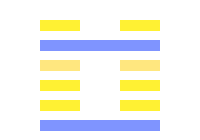
3.1.2.3.5.6 (3 > 18) - THE KUN HEXAGRAM
- 1. The first line, undivided, shows the difficulty (its subject has) in advancing. It will be advantageous for him to abide correct and firm; advantageous (also) to be made a feudal ruler.
- 2. The second line, divided, shows (its subject) distressed and obliged to return; (even) the horses of her chariot (also) seem to be retreating. (But) not by a spoiler (is she assailed), but by one who seeks her to be his wife. The young lady maintains her firm correctness, and declines a union. After ten years she will be united, and have children.
- 3. The third line, divided, shows one following the deer without (the guidance of) the forester, and only finding himself in the midst of the forest. The superior man, acquainted with the secret risks, thinks it better to give up the chase. If he went forward, he would regret it.
- 5. The fifth line, undivided, shows the difficulties in the way of (its subject's) dispensing the rich favours that might be expected from him. With firmness and correctness there will be good fortune in small things; (even) with them in great things there will be evil.
- 6. The topmost line, divided, shows (its subject) with the horses of his chariot obliged to retreat, and weeping tears of blood in streams.
3.1.2.3.5.6 (3 > 18) - Resolving difficulties
One believes oneself above others when they should highlight them.
Bing DeepL Google Yandex3.1.2.3.5.6 (3 > 18) - Resolving difficulties
One believes oneself above others when they should highlight them.
Bing DeepL Google Yandex3.1.2.3.5.6 (3 > 18) - T’un, la difficulté initiale
T’un et tchun : A. 1. Bourgeon, pousse ; 2. Croissance, activité ; 3. Grandir, avancer. — B. Difficultés, arrêté dans son avancement, échec.
- 1. Pour s’établir solidement, il faut se maintenir en fermeté et droiture. (Pour maintenir le royaume), il est bon de constituer des chefs féodaux. Bien qu’on ait des difficultés, la volonté doit toujours s’attacher au devoir. Si, bien qu’élevé, on condescend aux besoins des petits, on s’attachera fortement le peuple.
-
2. 2a. Tchun est comme arrêté par les difficultés, comme un cavalier dont le cheval veut reculer (ou : un cheval monté qui veut...).
2b. C’est comme la jeune fille qui veut épouser un brigand ravisseur, elle doit rester inébranlable et attendre (plutôt) dix ans. (Malgré cela), elle pourra alors se marier et être mère. (Il est ici question de difficultés.)
Un équipage solide, l’enfantement après dix ans indique le retour à la prospérité, à l’avancement. -
3. Lorsque le gibier poursuivi s’enfonce inopinément dans une forêt profonde, le sage aime mieux l’abandonner que de s’exposer au danger. S’il l’y poursuit, il aura lieu de s’en repentir.
Il sera réduit à l’extrémité. -
5. Dans le développement de la sève des bourgeons, si elle se répand modérément, la croissance sera heureuse ; si elle se répand trop, le croissance sera empêchée.
Il en est ainsi si elle se répand avant d’être suffisamment riche et forte.
Obstacle au développement : s’il est petit, l’issue peut être heureuse ; s’il est grand, fin malheureuse. - 6. L’avancement, arrêté comme un cheval monté qui recule, fait répandre des larmes amères et abondantes.
3.1.2.3.5.6 (3 > 18) - Remédier aux difficultés
On se croit au-dessus des autres alors qu'on devrait les mettre en valeur.
Bing DeepL Google Yandex3.1.2.3.5.6 (3 > 18) - Megoldás
- 1. Példamutató ha valaki mások segítségére siet a nehézségek ellenére.
- 2. Megbízható kapcsolatokat kell kialakítania mielőtt mások elfogadnák.
- 3. Magányosan halad ismeretlen terepen. Vezetőt kell keresnie vagy visszafordulnia.
- 5. Tudni akar mielőtt döntene.
- 6. Egyedül folytatja tovább mert mások biztosítékokat akarnak mielőtt támogatnák a fejlesztéseket. Tétotvázás helyett meg kell változtatnia szomszédságát hogy túlléphessen a nehézségeken.

3.4.5.6 (3 > 21) - THE KUN HEXAGRAM
- 4. The fourth line, divided, shows (its subject as a lady), the horses of whose chariot appear in retreat. She seeks, however, (the help of) him who seeks her to be his wife. Advance will be fortunate; all will turn out advantageously.
- 5. The fifth line, undivided, shows the difficulties in the way of (its subject's) dispensing the rich favours that might be expected from him. With firmness and correctness there will be good fortune in small things; (even) with them in great things there will be evil.
- 6. The topmost line, divided, shows (its subject) with the horses of his chariot obliged to retreat, and weeping tears of blood in streams.
3.4.5.6 (3 > 21) - Resolving difficulties
One makes reservations so that others remember what they have been told.
Bing DeepL Google Yandex3.4.5.6 (3 > 21) - Resolving difficulties
One makes reservations so that others remember what they have been told.
Bing DeepL Google Yandex3.4.5.6 (3 > 21) - T’un, la difficulté initiale
T’un et tchun : A. 1. Bourgeon, pousse ; 2. Croissance, activité ; 3. Grandir, avancer. — B. Difficultés, arrêté dans son avancement, échec.
-
4. Si elle est demandée en mariage selon les rites, qu’elle y aille et ce sera bien. Cela lui sera avantageux.
Il en est de même de l’équipage arrêté qui reprend sa course. -
5. Dans le développement de la sève des bourgeons, si elle se répand modérément, la croissance sera heureuse ; si elle se répand trop, le croissance sera empêchée.
Il en est ainsi si elle se répand avant d’être suffisamment riche et forte.
Obstacle au développement : s’il est petit, l’issue peut être heureuse ; s’il est grand, fin malheureuse. - 6. L’avancement, arrêté comme un cheval monté qui recule, fait répandre des larmes amères et abondantes.
3.4.5.6 (3 > 21) - Remédier aux difficultés
On fait des réserves pour que les autres se souviennent de ce qu'on leur a dit.
Bing DeepL Google Yandex3.4.5.6 (3 > 21) - Megoldás
- 4. Segítséget kap ha kivárja a sorát.
- 5. Tudni akar mielőtt döntene.
- 6. Egyedül folytatja tovább mert mások biztosítékokat akarnak mielőtt támogatnák a fejlesztéseket. Tétotvázás helyett meg kell változtatnia szomszédságát hogy túlléphessen a nehézségeken.
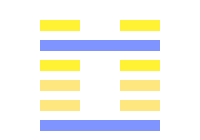
3.1.4.5.6 (3 > 35) - THE KUN HEXAGRAM
- 1. The first line, undivided, shows the difficulty (its subject has) in advancing. It will be advantageous for him to abide correct and firm; advantageous (also) to be made a feudal ruler.
- 4. The fourth line, divided, shows (its subject as a lady), the horses of whose chariot appear in retreat. She seeks, however, (the help of) him who seeks her to be his wife. Advance will be fortunate; all will turn out advantageously.
- 5. The fifth line, undivided, shows the difficulties in the way of (its subject's) dispensing the rich favours that might be expected from him. With firmness and correctness there will be good fortune in small things; (even) with them in great things there will be evil.
- 6. The topmost line, divided, shows (its subject) with the horses of his chariot obliged to retreat, and weeping tears of blood in streams.
3.1.4.5.6 (3 > 35) - Bypassing legislation
One enters a lawless area to be authorised to do what others do not want.
Bing DeepL Google Yandex3.1.4.5.6 (3 > 35) - Bypassing legislation
One enters a lawless area to be authorized to do what others do not want.
Bing DeepL Google Yandex3.1.4.5.6 (3 > 35) - T’un, la difficulté initiale
T’un et tchun : A. 1. Bourgeon, pousse ; 2. Croissance, activité ; 3. Grandir, avancer. — B. Difficultés, arrêté dans son avancement, échec.
- 1. Pour s’établir solidement, il faut se maintenir en fermeté et droiture. (Pour maintenir le royaume), il est bon de constituer des chefs féodaux. Bien qu’on ait des difficultés, la volonté doit toujours s’attacher au devoir. Si, bien qu’élevé, on condescend aux besoins des petits, on s’attachera fortement le peuple.
-
4. Si elle est demandée en mariage selon les rites, qu’elle y aille et ce sera bien. Cela lui sera avantageux.
Il en est de même de l’équipage arrêté qui reprend sa course. -
5. Dans le développement de la sève des bourgeons, si elle se répand modérément, la croissance sera heureuse ; si elle se répand trop, le croissance sera empêchée.
Il en est ainsi si elle se répand avant d’être suffisamment riche et forte.
Obstacle au développement : s’il est petit, l’issue peut être heureuse ; s’il est grand, fin malheureuse. - 6. L’avancement, arrêté comme un cheval monté qui recule, fait répandre des larmes amères et abondantes.
3.1.4.5.6 (3 > 35) - Contourner la législation
On entre dans une zone de non-droit pour être autorisé à faire ce que les autres ne veulent pas.
Bing DeepL Google Yandex3.1.4.5.6 (3 > 35) - Megoldás
- 1. Példamutató ha valaki mások segítségére siet a nehézségek ellenére.
- 4. Segítséget kap ha kivárja a sorát.
- 5. Tudni akar mielőtt döntene.
- 6. Egyedül folytatja tovább mert mások biztosítékokat akarnak mielőtt támogatnák a fejlesztéseket. Tétotvázás helyett meg kell változtatnia szomszédságát hogy túlléphessen a nehézségeken.

3.2.4.5.6 (3 > 38) - THE KUN HEXAGRAM
- 2. The second line, divided, shows (its subject) distressed and obliged to return; (even) the horses of her chariot (also) seem to be retreating. (But) not by a spoiler (is she assailed), but by one who seeks her to be his wife. The young lady maintains her firm correctness, and declines a union. After ten years she will be united, and have children.
- 4. The fourth line, divided, shows (its subject as a lady), the horses of whose chariot appear in retreat. She seeks, however, (the help of) him who seeks her to be his wife. Advance will be fortunate; all will turn out advantageously.
- 5. The fifth line, undivided, shows the difficulties in the way of (its subject's) dispensing the rich favours that might be expected from him. With firmness and correctness there will be good fortune in small things; (even) with them in great things there will be evil.
- 6. The topmost line, divided, shows (its subject) with the horses of his chariot obliged to retreat, and weeping tears of blood in streams.
3.2.4.5.6 (3 > 38) - Learning to avoid traps
One notices dividing lines that do not allow them to go where they want.
Bing DeepL Google Yandex3.2.4.5.6 (3 > 38) - Learning to avoid traps
One notices dividing lines that do not allow them to go where they want.
Bing DeepL Google Yandex3.2.4.5.6 (3 > 38) - T’un, la difficulté initiale
T’un et tchun : A. 1. Bourgeon, pousse ; 2. Croissance, activité ; 3. Grandir, avancer. — B. Difficultés, arrêté dans son avancement, échec.
-
2. 2a. Tchun est comme arrêté par les difficultés, comme un cavalier dont le cheval veut reculer (ou : un cheval monté qui veut...).
2b. C’est comme la jeune fille qui veut épouser un brigand ravisseur, elle doit rester inébranlable et attendre (plutôt) dix ans. (Malgré cela), elle pourra alors se marier et être mère. (Il est ici question de difficultés.)
Un équipage solide, l’enfantement après dix ans indique le retour à la prospérité, à l’avancement. -
4. Si elle est demandée en mariage selon les rites, qu’elle y aille et ce sera bien. Cela lui sera avantageux.
Il en est de même de l’équipage arrêté qui reprend sa course. -
5. Dans le développement de la sève des bourgeons, si elle se répand modérément, la croissance sera heureuse ; si elle se répand trop, le croissance sera empêchée.
Il en est ainsi si elle se répand avant d’être suffisamment riche et forte.
Obstacle au développement : s’il est petit, l’issue peut être heureuse ; s’il est grand, fin malheureuse. - 6. L’avancement, arrêté comme un cheval monté qui recule, fait répandre des larmes amères et abondantes.
3.2.4.5.6 (3 > 38) - Apprendre à éviter les pièges
On remarque des lignes séparatrices qui ne permettent pas d'aller où on veut.
Bing DeepL Google Yandex3.2.4.5.6 (3 > 38) - Megoldás
- 2. Megbízható kapcsolatokat kell kialakítania mielőtt mások elfogadnák.
- 4. Segítséget kap ha kivárja a sorát.
- 5. Tudni akar mielőtt döntene.
- 6. Egyedül folytatja tovább mert mások biztosítékokat akarnak mielőtt támogatnák a fejlesztéseket. Tétotvázás helyett meg kell változtatnia szomszédságát hogy túlléphessen a nehézségeken.
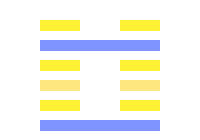
3.1.2.4.5.6 (3 > 64) - THE KUN HEXAGRAM
- 1. The first line, undivided, shows the difficulty (its subject has) in advancing. It will be advantageous for him to abide correct and firm; advantageous (also) to be made a feudal ruler.
- 2. The second line, divided, shows (its subject) distressed and obliged to return; (even) the horses of her chariot (also) seem to be retreating. (But) not by a spoiler (is she assailed), but by one who seeks her to be his wife. The young lady maintains her firm correctness, and declines a union. After ten years she will be united, and have children.
- 4. The fourth line, divided, shows (its subject as a lady), the horses of whose chariot appear in retreat. She seeks, however, (the help of) him who seeks her to be his wife. Advance will be fortunate; all will turn out advantageously.
- 5. The fifth line, undivided, shows the difficulties in the way of (its subject's) dispensing the rich favours that might be expected from him. With firmness and correctness there will be good fortune in small things; (even) with them in great things there will be evil.
- 6. The topmost line, divided, shows (its subject) with the horses of his chariot obliged to retreat, and weeping tears of blood in streams.
3.1.2.4.5.6 (3 > 64) - Resolving difficulties
One is regarded as being tender but they have some very clear-cut ideas in store.
Bing DeepL Google Yandex3.1.2.4.5.6 (3 > 64) - Resolving difficulties
One is regarded as being tender but they have some very clear-cut ideas in store.
Bing DeepL Google Yandex3.1.2.4.5.6 (3 > 64) - T’un, la difficulté initiale
T’un et tchun : A. 1. Bourgeon, pousse ; 2. Croissance, activité ; 3. Grandir, avancer. — B. Difficultés, arrêté dans son avancement, échec.
- 1. Pour s’établir solidement, il faut se maintenir en fermeté et droiture. (Pour maintenir le royaume), il est bon de constituer des chefs féodaux. Bien qu’on ait des difficultés, la volonté doit toujours s’attacher au devoir. Si, bien qu’élevé, on condescend aux besoins des petits, on s’attachera fortement le peuple.
-
2. 2a. Tchun est comme arrêté par les difficultés, comme un cavalier dont le cheval veut reculer (ou : un cheval monté qui veut...).
2b. C’est comme la jeune fille qui veut épouser un brigand ravisseur, elle doit rester inébranlable et attendre (plutôt) dix ans. (Malgré cela), elle pourra alors se marier et être mère. (Il est ici question de difficultés.)
Un équipage solide, l’enfantement après dix ans indique le retour à la prospérité, à l’avancement. -
4. Si elle est demandée en mariage selon les rites, qu’elle y aille et ce sera bien. Cela lui sera avantageux.
Il en est de même de l’équipage arrêté qui reprend sa course. -
5. Dans le développement de la sève des bourgeons, si elle se répand modérément, la croissance sera heureuse ; si elle se répand trop, le croissance sera empêchée.
Il en est ainsi si elle se répand avant d’être suffisamment riche et forte.
Obstacle au développement : s’il est petit, l’issue peut être heureuse ; s’il est grand, fin malheureuse. - 6. L’avancement, arrêté comme un cheval monté qui recule, fait répandre des larmes amères et abondantes.
3.1.2.4.5.6 (3 > 64) - Remédier aux difficultés
On passe pour être un tendre mais on a en réserve des idées bien tranchées.
Bing DeepL Google Yandex3.1.2.4.5.6 (3 > 64) - Megoldás
- 1. Példamutató ha valaki mások segítségére siet a nehézségek ellenére.
- 2. Megbízható kapcsolatokat kell kialakítania mielőtt mások elfogadnák.
- 4. Segítséget kap ha kivárja a sorát.
- 5. Tudni akar mielőtt döntene.
- 6. Egyedül folytatja tovább mert mások biztosítékokat akarnak mielőtt támogatnák a fejlesztéseket. Tétotvázás helyett meg kell változtatnia szomszédságát hogy túlléphessen a nehézségeken.

3.3.4.5.6 (3 > 30) - THE KUN HEXAGRAM
- 3. The third line, divided, shows one following the deer without (the guidance of) the forester, and only finding himself in the midst of the forest. The superior man, acquainted with the secret risks, thinks it better to give up the chase. If he went forward, he would regret it.
- 4. The fourth line, divided, shows (its subject as a lady), the horses of whose chariot appear in retreat. She seeks, however, (the help of) him who seeks her to be his wife. Advance will be fortunate; all will turn out advantageously.
- 5. The fifth line, undivided, shows the difficulties in the way of (its subject's) dispensing the rich favours that might be expected from him. With firmness and correctness there will be good fortune in small things; (even) with them in great things there will be evil.
- 6. The topmost line, divided, shows (its subject) with the horses of his chariot obliged to retreat, and weeping tears of blood in streams.
3.3.4.5.6 (3 > 30) - Resolving difficulties
One know the solution but others are not ready to accept it.
Bing DeepL Google Yandex3.3.4.5.6 (3 > 30) - Resolving difficulties
One know the solution but others are not ready to accept it.
Bing DeepL Google Yandex3.3.4.5.6 (3 > 30) - T’un, la difficulté initiale
T’un et tchun : A. 1. Bourgeon, pousse ; 2. Croissance, activité ; 3. Grandir, avancer. — B. Difficultés, arrêté dans son avancement, échec.
-
3. Lorsque le gibier poursuivi s’enfonce inopinément dans une forêt profonde, le sage aime mieux l’abandonner que de s’exposer au danger. S’il l’y poursuit, il aura lieu de s’en repentir.
Il sera réduit à l’extrémité. -
4. Si elle est demandée en mariage selon les rites, qu’elle y aille et ce sera bien. Cela lui sera avantageux.
Il en est de même de l’équipage arrêté qui reprend sa course. -
5. Dans le développement de la sève des bourgeons, si elle se répand modérément, la croissance sera heureuse ; si elle se répand trop, le croissance sera empêchée.
Il en est ainsi si elle se répand avant d’être suffisamment riche et forte.
Obstacle au développement : s’il est petit, l’issue peut être heureuse ; s’il est grand, fin malheureuse. - 6. L’avancement, arrêté comme un cheval monté qui recule, fait répandre des larmes amères et abondantes.
3.3.4.5.6 (3 > 30) - Remédier aux difficultés
On connait la solution mais les autres ne sont pas prêts à l'accepter.
Bing DeepL Google Yandex3.3.4.5.6 (3 > 30) - Megoldás
- 3. Magányosan halad ismeretlen terepen. Vezetőt kell keresnie vagy visszafordulnia.
- 4. Segítséget kap ha kivárja a sorát.
- 5. Tudni akar mielőtt döntene.
- 6. Egyedül folytatja tovább mert mások biztosítékokat akarnak mielőtt támogatnák a fejlesztéseket. Tétotvázás helyett meg kell változtatnia szomszédságát hogy túlléphessen a nehézségeken.
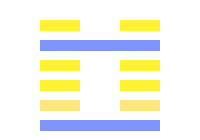
3.1.3.4.5.6 (3 > 56) - THE KUN HEXAGRAM
- 1. The first line, undivided, shows the difficulty (its subject has) in advancing. It will be advantageous for him to abide correct and firm; advantageous (also) to be made a feudal ruler.
- 3. The third line, divided, shows one following the deer without (the guidance of) the forester, and only finding himself in the midst of the forest. The superior man, acquainted with the secret risks, thinks it better to give up the chase. If he went forward, he would regret it.
- 4. The fourth line, divided, shows (its subject as a lady), the horses of whose chariot appear in retreat. She seeks, however, (the help of) him who seeks her to be his wife. Advance will be fortunate; all will turn out advantageously.
- 5. The fifth line, undivided, shows the difficulties in the way of (its subject's) dispensing the rich favours that might be expected from him. With firmness and correctness there will be good fortune in small things; (even) with them in great things there will be evil.
- 6. The topmost line, divided, shows (its subject) with the horses of his chariot obliged to retreat, and weeping tears of blood in streams.
3.1.3.4.5.6 (3 > 56) - Resolving difficulties
One knows well the temperament of the short-tempered so they say nothing.
Bing DeepL Google Yandex3.1.3.4.5.6 (3 > 56) - Resolving difficulties
One knows well the temperament of the short-tempered so they say nothing.
Bing DeepL Google Yandex3.1.3.4.5.6 (3 > 56) - T’un, la difficulté initiale
T’un et tchun : A. 1. Bourgeon, pousse ; 2. Croissance, activité ; 3. Grandir, avancer. — B. Difficultés, arrêté dans son avancement, échec.
- 1. Pour s’établir solidement, il faut se maintenir en fermeté et droiture. (Pour maintenir le royaume), il est bon de constituer des chefs féodaux. Bien qu’on ait des difficultés, la volonté doit toujours s’attacher au devoir. Si, bien qu’élevé, on condescend aux besoins des petits, on s’attachera fortement le peuple.
-
3. Lorsque le gibier poursuivi s’enfonce inopinément dans une forêt profonde, le sage aime mieux l’abandonner que de s’exposer au danger. S’il l’y poursuit, il aura lieu de s’en repentir.
Il sera réduit à l’extrémité. -
4. Si elle est demandée en mariage selon les rites, qu’elle y aille et ce sera bien. Cela lui sera avantageux.
Il en est de même de l’équipage arrêté qui reprend sa course. -
5. Dans le développement de la sève des bourgeons, si elle se répand modérément, la croissance sera heureuse ; si elle se répand trop, le croissance sera empêchée.
Il en est ainsi si elle se répand avant d’être suffisamment riche et forte.
Obstacle au développement : s’il est petit, l’issue peut être heureuse ; s’il est grand, fin malheureuse. - 6. L’avancement, arrêté comme un cheval monté qui recule, fait répandre des larmes amères et abondantes.
3.1.3.4.5.6 (3 > 56) - Remédier aux difficultés
On connait bien le tempérament des colériques alors on se tait.
Bing DeepL Google Yandex3.1.3.4.5.6 (3 > 56) - Megoldás
- 1. Példamutató ha valaki mások segítségére siet a nehézségek ellenére.
- 3. Magányosan halad ismeretlen terepen. Vezetőt kell keresnie vagy visszafordulnia.
- 4. Segítséget kap ha kivárja a sorát.
- 5. Tudni akar mielőtt döntene.
- 6. Egyedül folytatja tovább mert mások biztosítékokat akarnak mielőtt támogatnák a fejlesztéseket. Tétotvázás helyett meg kell változtatnia szomszédságát hogy túlléphessen a nehézségeken.

3.2.3.4.5.6 (3 > 14) - THE KUN HEXAGRAM
- 2. The second line, divided, shows (its subject) distressed and obliged to return; (even) the horses of her chariot (also) seem to be retreating. (But) not by a spoiler (is she assailed), but by one who seeks her to be his wife. The young lady maintains her firm correctness, and declines a union. After ten years she will be united, and have children.
- 3. The third line, divided, shows one following the deer without (the guidance of) the forester, and only finding himself in the midst of the forest. The superior man, acquainted with the secret risks, thinks it better to give up the chase. If he went forward, he would regret it.
- 4. The fourth line, divided, shows (its subject as a lady), the horses of whose chariot appear in retreat. She seeks, however, (the help of) him who seeks her to be his wife. Advance will be fortunate; all will turn out advantageously.
- 5. The fifth line, undivided, shows the difficulties in the way of (its subject's) dispensing the rich favours that might be expected from him. With firmness and correctness there will be good fortune in small things; (even) with them in great things there will be evil.
- 6. The topmost line, divided, shows (its subject) with the horses of his chariot obliged to retreat, and weeping tears of blood in streams.
3.2.3.4.5.6 (3 > 14) - Resolving difficulties
One spends time with those who could help them.
Bing DeepL Google Yandex3.2.3.4.5.6 (3 > 14) - Resolving difficulties
One spends time with those who could help them.
Bing DeepL Google Yandex3.2.3.4.5.6 (3 > 14) - T’un, la difficulté initiale
T’un et tchun : A. 1. Bourgeon, pousse ; 2. Croissance, activité ; 3. Grandir, avancer. — B. Difficultés, arrêté dans son avancement, échec.
-
2. 2a. Tchun est comme arrêté par les difficultés, comme un cavalier dont le cheval veut reculer (ou : un cheval monté qui veut...).
2b. C’est comme la jeune fille qui veut épouser un brigand ravisseur, elle doit rester inébranlable et attendre (plutôt) dix ans. (Malgré cela), elle pourra alors se marier et être mère. (Il est ici question de difficultés.)
Un équipage solide, l’enfantement après dix ans indique le retour à la prospérité, à l’avancement. -
3. Lorsque le gibier poursuivi s’enfonce inopinément dans une forêt profonde, le sage aime mieux l’abandonner que de s’exposer au danger. S’il l’y poursuit, il aura lieu de s’en repentir.
Il sera réduit à l’extrémité. -
4. Si elle est demandée en mariage selon les rites, qu’elle y aille et ce sera bien. Cela lui sera avantageux.
Il en est de même de l’équipage arrêté qui reprend sa course. -
5. Dans le développement de la sève des bourgeons, si elle se répand modérément, la croissance sera heureuse ; si elle se répand trop, le croissance sera empêchée.
Il en est ainsi si elle se répand avant d’être suffisamment riche et forte.
Obstacle au développement : s’il est petit, l’issue peut être heureuse ; s’il est grand, fin malheureuse. - 6. L’avancement, arrêté comme un cheval monté qui recule, fait répandre des larmes amères et abondantes.
3.2.3.4.5.6 (3 > 14) - Remédier aux difficultés
On passe du temps avec ceux qui pourraient nous aider.
Bing DeepL Google Yandex3.2.3.4.5.6 (3 > 14) - Megoldás
- 2. Megbízható kapcsolatokat kell kialakítania mielőtt mások elfogadnák.
- 3. Magányosan halad ismeretlen terepen. Vezetőt kell keresnie vagy visszafordulnia.
- 4. Segítséget kap ha kivárja a sorát.
- 5. Tudni akar mielőtt döntene.
- 6. Egyedül folytatja tovább mert mások biztosítékokat akarnak mielőtt támogatnák a fejlesztéseket. Tétotvázás helyett meg kell változtatnia szomszédságát hogy túlléphessen a nehézségeken.
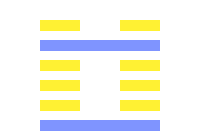
3.1.2.3.4.5.6 (3 > 50) - THE KUN HEXAGRAM
- 1. The first line, undivided, shows the difficulty (its subject has) in advancing. It will be advantageous for him to abide correct and firm; advantageous (also) to be made a feudal ruler.
- 2. The second line, divided, shows (its subject) distressed and obliged to return; (even) the horses of her chariot (also) seem to be retreating. (But) not by a spoiler (is she assailed), but by one who seeks her to be his wife. The young lady maintains her firm correctness, and declines a union. After ten years she will be united, and have children.
- 3. The third line, divided, shows one following the deer without (the guidance of) the forester, and only finding himself in the midst of the forest. The superior man, acquainted with the secret risks, thinks it better to give up the chase. If he went forward, he would regret it.
- 4. The fourth line, divided, shows (its subject as a lady), the horses of whose chariot appear in retreat. She seeks, however, (the help of) him who seeks her to be his wife. Advance will be fortunate; all will turn out advantageously.
- 5. The fifth line, undivided, shows the difficulties in the way of (its subject's) dispensing the rich favours that might be expected from him. With firmness and correctness there will be good fortune in small things; (even) with them in great things there will be evil.
- 6. The topmost line, divided, shows (its subject) with the horses of his chariot obliged to retreat, and weeping tears of blood in streams.
3.1.2.3.4.5.6 (3 > 50) - Resolving difficulties
Others want one to stand beside them.
Bing DeepL Google Yandex3.1.2.3.4.5.6 (3 > 50) - Resolving difficulties
Others want one to be involved with them.
Bing DeepL Google Yandex3.1.2.3.4.5.6 (3 > 50) - T’un, la difficulté initiale
T’un et tchun : A. 1. Bourgeon, pousse ; 2. Croissance, activité ; 3. Grandir, avancer. — B. Difficultés, arrêté dans son avancement, échec.
- 1. Pour s’établir solidement, il faut se maintenir en fermeté et droiture. (Pour maintenir le royaume), il est bon de constituer des chefs féodaux. Bien qu’on ait des difficultés, la volonté doit toujours s’attacher au devoir. Si, bien qu’élevé, on condescend aux besoins des petits, on s’attachera fortement le peuple.
-
2. 2a. Tchun est comme arrêté par les difficultés, comme un cavalier dont le cheval veut reculer (ou : un cheval monté qui veut...).
2b. C’est comme la jeune fille qui veut épouser un brigand ravisseur, elle doit rester inébranlable et attendre (plutôt) dix ans. (Malgré cela), elle pourra alors se marier et être mère. (Il est ici question de difficultés.)
Un équipage solide, l’enfantement après dix ans indique le retour à la prospérité, à l’avancement. -
3. Lorsque le gibier poursuivi s’enfonce inopinément dans une forêt profonde, le sage aime mieux l’abandonner que de s’exposer au danger. S’il l’y poursuit, il aura lieu de s’en repentir.
Il sera réduit à l’extrémité. -
4. Si elle est demandée en mariage selon les rites, qu’elle y aille et ce sera bien. Cela lui sera avantageux.
Il en est de même de l’équipage arrêté qui reprend sa course. -
5. Dans le développement de la sève des bourgeons, si elle se répand modérément, la croissance sera heureuse ; si elle se répand trop, le croissance sera empêchée.
Il en est ainsi si elle se répand avant d’être suffisamment riche et forte.
Obstacle au développement : s’il est petit, l’issue peut être heureuse ; s’il est grand, fin malheureuse. - 6. L’avancement, arrêté comme un cheval monté qui recule, fait répandre des larmes amères et abondantes.
3.1.2.3.4.5.6 (3 > 50) - Remédier aux difficultés
Les autres veulent que l'on s'engage à leur côté.
Bing DeepL Google Yandex3.1.2.3.4.5.6 (3 > 50) - Megoldás
- 1. Példamutató ha valaki mások segítségére siet a nehézségek ellenére.
- 2. Megbízható kapcsolatokat kell kialakítania mielőtt mások elfogadnák.
- 3. Magányosan halad ismeretlen terepen. Vezetőt kell keresnie vagy visszafordulnia.
- 4. Segítséget kap ha kivárja a sorát.
- 5. Tudni akar mielőtt döntene.
- 6. Egyedül folytatja tovább mert mások biztosítékokat akarnak mielőtt támogatnák a fejlesztéseket. Tétotvázás helyett meg kell változtatnia szomszédságát hogy túlléphessen a nehézségeken.

